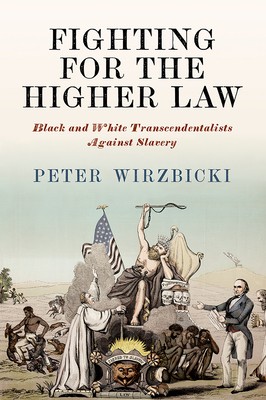
- We will send in 10–14 business days.
- Author: Peter Wirzbicki
- Publisher: University of Pennsylvania Press
- ISBN-10: 0812252918
- ISBN-13: 9780812252910
- Format: 15.2 x 23.1 x 3.1 cm, hardcover
- Language: English
- SAVE -10% with code: EXTRA
Reviews
Description
In Fighting for the Higher Law, Peter Wirzbicki explores how important black abolitionists joined famous Transcendentalists to create a political philosophy that fired the radical struggle against American slavery.
In the cauldron of the antislavery movement, antislavery activists, such as William C. Nell, Thomas Sidney, and Charlotte Forten, and Transcendentalist intellectuals, including Ralph Waldo Emerson and Henry David Thoreau, developed a "Higher Law" ethos, a unique set of romantic political sensibilities--marked by moral enthusiasms, democratic idealism, and a vision of the self that could judge political questions from "higher" standards of morality and reason. The Transcendentalism that emerges here is not simply the dreamy philosophy of privileged white New Englanders, but a more populist movement, one that encouraged an uncompromising form of politics among a wide range of Northerners, black as well as white, working-class as well as wealthy. Invented to fight slavery, it would influence later labor, feminist, civil rights, and environmentalist activism. African American thinkers and activists have long engaged with American Transcendentalist ideas about "double consciousness," nonconformity, and civil disobedience. When thinkers like Martin Luther King, Jr., or W. E. B. Du Bois invoked Transcendentalist ideas, they were putting to use an intellectual movement that black radicals had participated in since the 1830s.EXTRA 10 % discount with code: EXTRA
The promotion ends in 18d.15:29:22
The discount code is valid when purchasing from 10 €. Discounts do not stack.
- Author: Peter Wirzbicki
- Publisher: University of Pennsylvania Press
- ISBN-10: 0812252918
- ISBN-13: 9780812252910
- Format: 15.2 x 23.1 x 3.1 cm, hardcover
- Language: English English
In Fighting for the Higher Law, Peter Wirzbicki explores how important black abolitionists joined famous Transcendentalists to create a political philosophy that fired the radical struggle against American slavery.
In the cauldron of the antislavery movement, antislavery activists, such as William C. Nell, Thomas Sidney, and Charlotte Forten, and Transcendentalist intellectuals, including Ralph Waldo Emerson and Henry David Thoreau, developed a "Higher Law" ethos, a unique set of romantic political sensibilities--marked by moral enthusiasms, democratic idealism, and a vision of the self that could judge political questions from "higher" standards of morality and reason. The Transcendentalism that emerges here is not simply the dreamy philosophy of privileged white New Englanders, but a more populist movement, one that encouraged an uncompromising form of politics among a wide range of Northerners, black as well as white, working-class as well as wealthy. Invented to fight slavery, it would influence later labor, feminist, civil rights, and environmentalist activism. African American thinkers and activists have long engaged with American Transcendentalist ideas about "double consciousness," nonconformity, and civil disobedience. When thinkers like Martin Luther King, Jr., or W. E. B. Du Bois invoked Transcendentalist ideas, they were putting to use an intellectual movement that black radicals had participated in since the 1830s.

Reviews